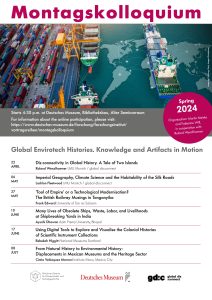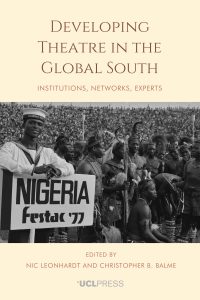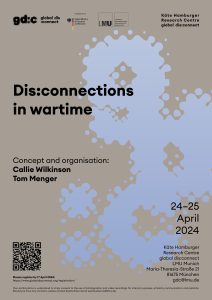14 – 15 November, Resistant writing. Lili Körber – literature, politics and exile
 Conference of the Käte Hamburger Research Centre global dis:connect (LMU Munich) in cooperation with the Literaturhaus Wien / Österreichische Exilbibliothek, organised by Burcu Dogramaci and Günther Sandner in collaboration with Veronika Zwerger
Conference of the Käte Hamburger Research Centre global dis:connect (LMU Munich) in cooperation with the Literaturhaus Wien / Österreichische Exilbibliothek, organised by Burcu Dogramaci and Günther Sandner in collaboration with Veronika Zwerger
Date: 14–15 November 2024
Location: Österreichische Exilbibliothek im Literaturhaus Wien
Our conference and the edited volume we plan to publish are dedicated to the writer and political publicist Lili Körber (1897–1982). The accomplished literary scholar and writer, Muscovite by birth and later resident of Vienna, was a member of the Sozialdemokratische Arbeiterpartei (SDAP), the Vereinigung sozialistischer Schrifsteller and the Bund der Proletarisch-Revolutionären Schrifsteller Österreichs. She also expressed her political commitment in her journalism. Körber wrote for left- wing political periodicals such as the Wiener Arbeiter-Zeitung, Bildungsarbeit, the Rote Fahne and the Arbeiter-Illustrierte-Zeitung (AIZ). Together with Anna Seghers and Johannes R. Becher, she accepted an invitation from the Soviet state publishing house to travel to Moscow in 1930. She sought to learn about workers’ living and labour conditions by serving for several months as a drill operator at the Putilov tractor factory in Leningrad, a company with a “well-known history of revolutionary resistance during the Tsarist era”. (Hertling 1982)
She wrote about her experiences in the autobiographical novel Eine Frau erlebt den roten Alltag, which was published by Rowohlt Berlin in 1932 and whose cover was designed by artist John Hearjield. Körber created historical novels by reproducing documents such as pay slips and pages from her employment record book alongside her diary entries, which convey authentic and personal experiences.
Lili Körber’s 1934 novel Eine Jüdin erlebt das neue Deutschland is one of the first anti-fascist books to treat the transitional period between the end of the Weimar Republic and the establishment of the
Nazi state. It succinctly describes the ideological permeation of society. By October 1935, all of Körber’s writings were on the list of banned literature. Eine Frau erlebt den roten Alltag was one of the books burnt in 1933.
In her travelogue Begegnungen im Fernen Osten (Biblios Verlag, Budapest 1936) and Sato-San, ein japanischer Held. Ein satyrischer Zeitroman (Wiener Lesegilde, 1936), a satirical observation of Japanese fascism that can also be read as a parody of Hitler, she covered her 1934 journey to Japan and China. Not even the burning and banning of her books under National Socialism could prevent Körber from writing politically.
Shortly after the “Anschluss”, Körber fled Vienna, stopping over in Zurich before reaching Paris, where she wrote for Swiss newspapers and the Pariser Tageblatt. From April 1938, the social democratic newspaper Volksrecht in Zurich published Eine Österreicherin erlebt den Anschluß, in which Körber, under the pseudonym Agnes Muth, again processed her observations in a diary novel. She finally emigrated in June 1941 with the support of the Emergency Rescue Committee via Lisbon to New York, where she worked in a factory and as a nurse. Beyond a few newspaper articles in, for example, the Buenos Aires emigrant newspaper Das andere Deutschland, she published the novel Ein Amerikaner in Russland, in 1942/43 in the German-language New York ‘anti-Nazi newspaper’ Neue Volks-Zeitung. This text published in 1942-43 could be read as a criticism of Stalinism. In 1949, she wrote her unpublished English-language novel Farewell to Yesterday.
In Germany and Austria, Körber fell into oblivion as a result of political persecution, the confiscation and destruction of her books and her emigration. Today, her literary estate can be found in the Deutsches Exilarchiv 1933–1945 in the Deutsche Nationalbibliothek in Frankfurt/Main. Lili Körber has only occasionally been exhumed in recent decades. New editions of some of her books appeared in the 1980s, and published research on Lili Körber dates to the 1990s.
At the conference, we will discuss Lili Körber’s oeuvre for the first time from an interdisciplinary perspective and consider it as a corpus exemplifying dis:connectivities. The author will be situated in the contexts of politics, literature, art and gender at a time of political upheaval. We hope that examining Körber as a political activist and writer will also reflect back on the present, which is increasingly characterised by extremism, racism and anti-Semitism.
More information on the programme and the registration details will be published shortly.
Continue Reading





 Shannon Jackson (Berkeley), Delivery systems: ecological infrastructures across the arts
Shannon Jackson (Berkeley), Delivery systems: ecological infrastructures across the arts
 Workshop at the Käte Hamburger Research Centre global dis:connect, LMU Munich, organised by Günther Sandner and Alexander Reutlinger
Workshop at the Käte Hamburger Research Centre global dis:connect, LMU Munich, organised by Günther Sandner and Alexander Reutlinger Vernissage: 21 June, 18:00-22:00, Habibi Kiosk, Münchner Kammerspiele, Maximilianstr. 26, 80539 Munich
Vernissage: 21 June, 18:00-22:00, Habibi Kiosk, Münchner Kammerspiele, Maximilianstr. 26, 80539 Munich


 Workshop at the Paris Lodron University Salzburg, organised by Martin Knoll (Salzburg), Eva-Maria Troelenberg (Düsseldorf) and Roland Wenzlhuemer (Munich)
Workshop at the Paris Lodron University Salzburg, organised by Martin Knoll (Salzburg), Eva-Maria Troelenberg (Düsseldorf) and Roland Wenzlhuemer (Munich)
 Developing Theatre in the Global South
Developing Theatre in the Global South Perhaps nothing demonstrates the complexities of globalisation more clearly than war. The international reverberations of Russia’s invasion of Ukraine have painfully exposed the interconnected nature of modern economies and our vulnerability to forces beyond our control, prompting anxious speculations about deglobalisation. Yet, experts agree that the more likely outcome is not isolation, but instead, changing geographies of connection. Similarly, recent historical scholarship has complicated conventional understandings of war as a dividing force, instead emphasizing both the connections and disconnections that it brings in its wake. In wartime, enemies are dehumanised in government propaganda, travel is disrupted, and trade blockades are enforced.
Wartime is associated with absences, interruptions, and detours, as lives are lost, scientific exchanges are cut off, and mobilized populations find themselves transported far from home. Yet, war can also create new spaces of interaction and encounter, sometimes across enemy lines. Some of these exchanges are illicit, such as smugglers who evade military blockades, or spies who penetrate enemy territory. Others are more overt, between prisoners of war and their captors, or surgeons who treat enemy combatants. War can provide the impetus for new connections and the widening of geographical horizons in the pursuit of resources, sometimes with lasting consequences. War, in other words, is the optimal lens through which to trace global connections and disconnections.
Perhaps nothing demonstrates the complexities of globalisation more clearly than war. The international reverberations of Russia’s invasion of Ukraine have painfully exposed the interconnected nature of modern economies and our vulnerability to forces beyond our control, prompting anxious speculations about deglobalisation. Yet, experts agree that the more likely outcome is not isolation, but instead, changing geographies of connection. Similarly, recent historical scholarship has complicated conventional understandings of war as a dividing force, instead emphasizing both the connections and disconnections that it brings in its wake. In wartime, enemies are dehumanised in government propaganda, travel is disrupted, and trade blockades are enforced.
Wartime is associated with absences, interruptions, and detours, as lives are lost, scientific exchanges are cut off, and mobilized populations find themselves transported far from home. Yet, war can also create new spaces of interaction and encounter, sometimes across enemy lines. Some of these exchanges are illicit, such as smugglers who evade military blockades, or spies who penetrate enemy territory. Others are more overt, between prisoners of war and their captors, or surgeons who treat enemy combatants. War can provide the impetus for new connections and the widening of geographical horizons in the pursuit of resources, sometimes with lasting consequences. War, in other words, is the optimal lens through which to trace global connections and disconnections.
 Ever since the financial crisis of 2008 and the emergence of the New History of Capitalism, historians have rediscovered economic themes and sought to interrogate them with the conceptual and methodological tools developed by social and cultural historians. This new interest springs from global history — a broad church of scholarly endeavours that have sought to break the hold of national histories and area studies to emphasize broad contextualisation, connectivity and interdependence in historical developments across regions, ecosystems and geo-polities. While global histories are rooted in multiple scholarly traditions — the most influential of which remain environmental history, the new imperial history, postcolonialism and world-systems theories — most practitioners assume that scale matters and that transregional, transnational and global scales open new and important insights about questions previously regarded in local, national or even multinational frames. The New History of Capitalism contributes much to our understanding of global history but reinforces its neglect of some fundamental categories of social history — like the family and property — in favour of other key categories, mainly labour, work, production and a focus on the social context of specifically economic spheres of activity, like trade diasporas.
Ever since the financial crisis of 2008 and the emergence of the New History of Capitalism, historians have rediscovered economic themes and sought to interrogate them with the conceptual and methodological tools developed by social and cultural historians. This new interest springs from global history — a broad church of scholarly endeavours that have sought to break the hold of national histories and area studies to emphasize broad contextualisation, connectivity and interdependence in historical developments across regions, ecosystems and geo-polities. While global histories are rooted in multiple scholarly traditions — the most influential of which remain environmental history, the new imperial history, postcolonialism and world-systems theories — most practitioners assume that scale matters and that transregional, transnational and global scales open new and important insights about questions previously regarded in local, national or even multinational frames. The New History of Capitalism contributes much to our understanding of global history but reinforces its neglect of some fundamental categories of social history — like the family and property — in favour of other key categories, mainly labour, work, production and a focus on the social context of specifically economic spheres of activity, like trade diasporas.